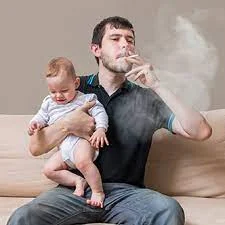Children are highly impressionable and susceptible to the behaviors and habits of their parents. Among these habits, smoking stands out as one with potentially profound psychological consequences for children who witness their fathers engage in this behavior. In this article, we explore the psychological effects that may occur when children observe their fathers smoking.
Children who regularly witness their fathers smoking may come to view this behavior as normal or socially acceptable. This normalization can have lasting effects, as they may grow up with a skewed perception of the health risks and social consequences associated with smoking. This misperception could influence their own attitudes toward smoking in the future.
Children often imitate the behaviors of their parents, especially when they view them as role models. Consequently, observing their fathers smoke can make children more likely to experiment with smoking themselves at a young age. This early experimentation can lead to lifelong smoking habits and expose them to the associated health risks.
The emotional impact on children who see their fathers smoke can be significant. They may experience feelings of worry, anxiety, and concern for their fathers' health. This emotional turmoil can affect their overall well-being and potentially lead to strained relationships within the family.
Children who witness their fathers smoking may experience cognitive dissonance. They may hear anti-smoking messages at school or through media campaigns, which contradict what they see at home. This internal conflict can lead to confusion and affect their psychological development.
Exposure to secondhand smoke from a smoking father can have direct health consequences for children. Secondhand smoke is known to cause respiratory problems and increase the risk of various health issues in children, further contributing to their psychological distress.
Some children may develop unhealthy coping mechanisms as a response to the stress and emotional turmoil caused by their father's smoking habit. This can include behaviors such as overeating, withdrawal from social activities, or even substance abuse in later life.
Normalization of Smoking
Children who regularly witness their fathers smoking may come to view this behavior as normal or socially acceptable. This normalization can have lasting effects, as they may grow up with a skewed perception of the health risks and social consequences associated with smoking. This misperception could influence their own attitudes toward smoking in the future.
Increased Risk of Experimentation
Children often imitate the behaviors of their parents, especially when they view them as role models. Consequently, observing their fathers smoke can make children more likely to experiment with smoking themselves at a young age. This early experimentation can lead to lifelong smoking habits and expose them to the associated health risks.
Emotional Impact
The emotional impact on children who see their fathers smoke can be significant. They may experience feelings of worry, anxiety, and concern for their fathers' health. This emotional turmoil can affect their overall well-being and potentially lead to strained relationships within the family.
Cognitive Dissonance
Children who witness their fathers smoking may experience cognitive dissonance. They may hear anti-smoking messages at school or through media campaigns, which contradict what they see at home. This internal conflict can lead to confusion and affect their psychological development.
Health Consequences
Exposure to secondhand smoke from a smoking father can have direct health consequences for children. Secondhand smoke is known to cause respiratory problems and increase the risk of various health issues in children, further contributing to their psychological distress.
Coping Mechanisms
Some children may develop unhealthy coping mechanisms as a response to the stress and emotional turmoil caused by their father's smoking habit. This can include behaviors such as overeating, withdrawal from social activities, or even substance abuse in later life.
Conclusion
It is essential for parents, particularly fathers, to recognize the potential harm their smoking behavior can cause to their children's well-being. Quitting smoking or taking steps to minimize exposure to secondhand smoke is not only a health-conscious decision but also a vital step in protecting the psychological health of their children. Additionally, educational efforts on the dangers of smoking should be made available to children to help them make informed choices regarding their own health.
The Psychological Impact on Children of Watching Their Father Smoke
 Reviewed by irvan mulya
on
5:52 PM
Rating:
Reviewed by irvan mulya
on
5:52 PM
Rating:
 Reviewed by irvan mulya
on
5:52 PM
Rating:
Reviewed by irvan mulya
on
5:52 PM
Rating:

















No comments:
Post a Comment